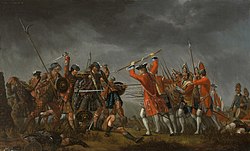

Stand Round my Brave Boys is a 1745 song composed by George Frideric Handel. [1] [2] It was commissioned to celebrate the Gentlemen Volunteers of the City of London, a regiment raised to resist the Jacobite Rebellion of 1745. Handel had close connections with the ruling House of Hanover, and composed several tunes supportive of a loyalist position opposed to the rival Jacobite House of Stuart during his career. It was part of the patriotic fervour that also saw God Save the King adopted as a popular song. Handel's piece was performed at the Theatre Royal, Drury Lane and then published on 14 November 1745. [3] It was later included in the Jacobite Relics , a compilation of songs from the era.